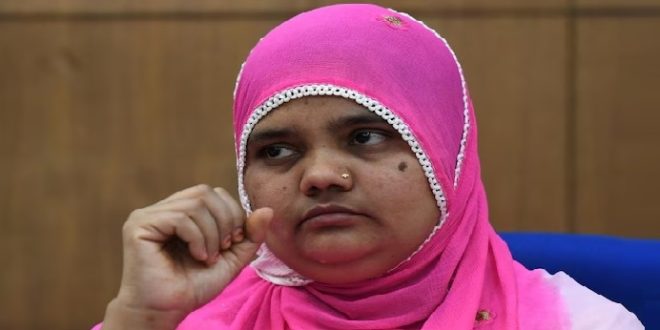09-01-2024
Bureau Report + Agencies
NEW DELHI: The Supreme Court has struck down the remission granted to 11 men convicted in the Bilkis Bano gangrape case of 2002.
 The court has ruled that the Gujarat government’s decision to remit their sentences and set them free was illegal. “Gujarat government had no jurisdiction to entertain the application for remission or pass the orders as it was not the appropriate government,” the court said on Monday (January 8).
The court has ruled that the Gujarat government’s decision to remit their sentences and set them free was illegal. “Gujarat government had no jurisdiction to entertain the application for remission or pass the orders as it was not the appropriate government,” the court said on Monday (January 8).
Bilkis was gang raped and seven members of her family were murdered during the Gujarat riots of 2002. The 11 convicts were released by the Gujarat government under its remission and premature release policy on August 15, 2022.
It was essentially whether Gujarat had the authority to issue the order for the remission of the sentences.
The crime had been committed on March 3, 2002 in Chapparwad village in Gujarat’s Dahod district, but the trial took place in Mumbai, where a special court convicted and sentenced the accused in 2008.
On Monday, the Supreme Court noted that the appropriate government to decide remission is the state within whose jurisdiction the accused were sentenced and not the state within whose territorial limits the offence was committed or the accused were imprisoned.
Therefore, the court ruled that the competent government in this matter would be the Maharashtra government.
 Under Articles 72 and 161 of the Constitution, the President and Governors of states can pardon a convict, and can also suspend, remit, or commute a sentence passed by the courts.
Under Articles 72 and 161 of the Constitution, the President and Governors of states can pardon a convict, and can also suspend, remit, or commute a sentence passed by the courts.
State governments too have the power to remit sentences under Section 432 of the Code of Criminal Procedure (CrPC). This is because prisons is a State Subject. (The CrPC is proposed to be replaced by the Bharatiya Nagarik Suraksha (Second) Sanhita. The law has been passed by Parliament and has obtained the assent of the President, but is yet to come into force.)
However, Section 433A of the CrPC puts certain restrictions on these powers of remission. It says; “wehere a sentence of imprisonment for life is imposed on conviction of a person for an offence for which death is one of the punishments provided by law, or where a sentence of death imposed on a person has been commuted under Section 433 into one of imprisonment for life, such person shall not be released from prison unless he had served at least fourteen years of imprisonment.”
States set up a Sentence Review Board to exercise the powers under Section 432 of the CrPC. The Supreme Court has held that states cannot exercise the power of remission arbitrarily, and must follow due process. While the policy varies from state to state, broadly the grounds for remission considered by the Board are the same.
 Pressmediaofindia
Pressmediaofindia




